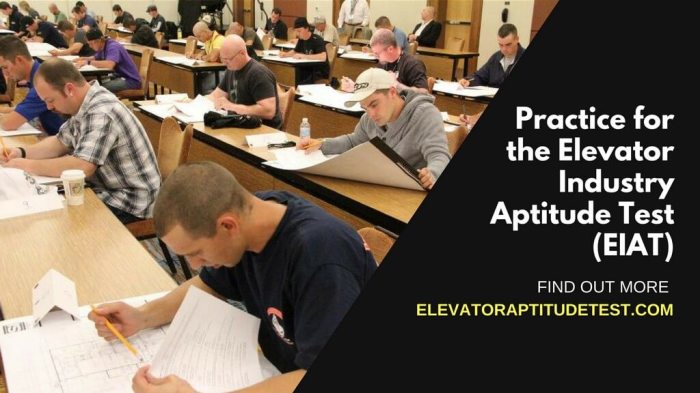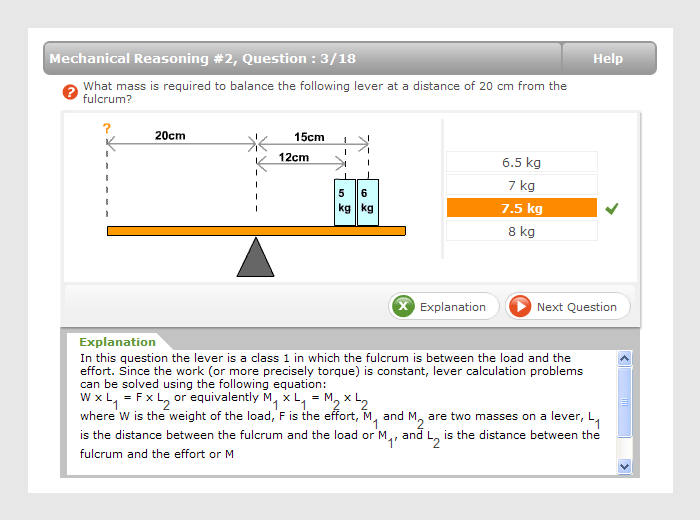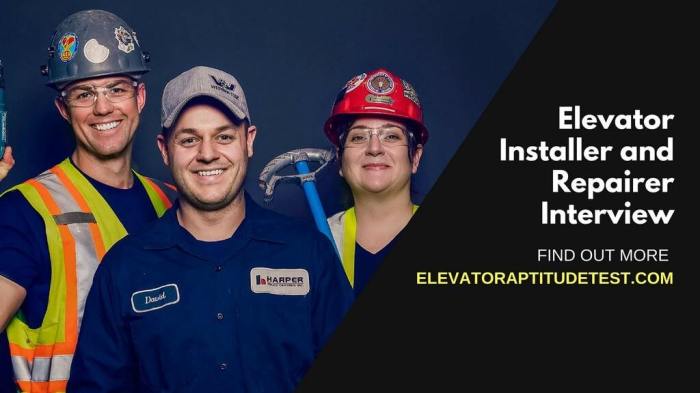Tech Elevator Aptitude Test Answers: A Comprehensive Guide to Success provides a comprehensive overview of the Tech Elevator Aptitude Test, equipping readers with the knowledge and strategies they need to excel in this crucial assessment. This guide delves into the test’s structure, question types, and scoring system, offering valuable insights and practical advice to help candidates achieve their desired outcomes.
Overview of Tech Elevator Aptitude Test
The Tech Elevator Aptitude Test is a standardized assessment designed to evaluate an individual’s cognitive abilities and suitability for the company’s immersive coding bootcamp program. The test comprises multiple sections, each focusing on specific cognitive domains relevant to the program’s curriculum and job requirements.
Sections and Question Types
The Tech Elevator Aptitude Test typically consists of the following sections:
- Quantitative Reasoning:Measures numerical and logical reasoning skills through questions involving algebra, geometry, and data interpretation.
- Verbal Reasoning:Assesses language comprehension, vocabulary, and reading comprehension through questions based on written passages.
- Coding Aptitude:Evaluates basic programming concepts and problem-solving abilities through questions that require understanding of coding principles and syntax.
- Problem Solving:Tests critical thinking and problem-solving skills through questions that present real-world scenarios and require logical reasoning and decision-making.
Scoring and Evaluation
The Tech Elevator Aptitude Test is scored based on the number of correct answers in each section. The scoring system is designed to identify individuals who possess the cognitive abilities and aptitude necessary to succeed in the coding bootcamp program.
The evaluation process involves a comprehensive review of the test results, taking into account an individual’s overall performance across all sections.
Tips for Preparing for the Tech Elevator Aptitude Test

To prepare effectively for the Tech Elevator Aptitude Test, a comprehensive study plan and effective preparation methods are crucial. This section provides valuable strategies, recommended resources, and guidance on time management and test-taking approaches to enhance your chances of success.
Study Strategies and Preparation Methods
- Review Test Syllabus:Familiarize yourself with the test format, topics covered, and the types of questions you can expect. This will help you prioritize your studies and allocate your time efficiently.
- Practice Regularly:Consistent practice is essential to improve your problem-solving skills and enhance your understanding of the concepts. Utilize online resources, practice questions, and mock tests to reinforce your knowledge.
- Focus on Problem-Solving:The test emphasizes problem-solving abilities. Develop your analytical thinking and logical reasoning skills by practicing various types of questions, including numerical reasoning, verbal reasoning, and situational judgment.
Recommended Resources for Studying and Practicing
- Official Tech Elevator Study Guide:This resource provides comprehensive coverage of the test topics and includes practice questions and mock tests.
- Online Practice Platforms:Utilize platforms like HackerRank, LeetCode, and GeeksforGeeks to access a vast collection of practice questions and mock tests.
- Books:Refer to books like “The Aptitude Test Workbook” by Kaplan and “McGraw-Hill’s Conquering Aptitude Tests” for additional practice materials and study tips.
Time Management and Test-Taking Strategies
- Time Management:Practice managing your time effectively during the test. Allocate a specific amount of time for each section and stick to it to avoid running out of time.
- Prioritize Questions:Focus on answering questions that you are confident about first. This will help you gain confidence and manage your time wisely.
- Guessing:If you are unsure about an answer, make an educated guess. The test typically does not penalize for incorrect answers.
Section-by-Section Analysis

The Tech Elevator Aptitude Test comprises four distinct sections: Logical Reasoning, Problem Solving, Reading Comprehension, and Quantitative Reasoning. Each section assesses specific cognitive abilities essential for success in the tech industry. By understanding the unique characteristics and requirements of each section, candidates can tailor their preparation strategies and improve their overall performance on the test.
Logical Reasoning
The Logical Reasoning section evaluates an individual’s ability to analyze and interpret logical arguments and draw valid conclusions. Common question types include:
- Deductive reasoning: Identifying logical relationships between premises and conclusions
- Inductive reasoning: Generalizing conclusions based on observed patterns or data
- Syllogisms: Identifying the validity of arguments based on the relationship between premises
Effective strategies for solving logical puzzles and syllogisms include:
- Breaking down complex arguments into simpler components
- Identifying the key assumptions and premises
- Applying logical rules and principles to draw valid conclusions
Problem Solving
The Problem Solving section assesses an individual’s analytical and problem-solving abilities. Different types of problem-solving questions include:
- Pattern recognition: Identifying patterns and sequences in data
- Quantitative reasoning: Solving mathematical problems and interpreting data
- Spatial reasoning: Visualizing and manipulating spatial relationships
To enhance problem-solving skills, candidates should focus on:
- Developing analytical thinking skills
- Practicing solving a variety of problem types
- Applying logical and systematic approaches to problem-solving
Reading Comprehension
The Reading Comprehension section evaluates an individual’s ability to understand and extract information from written text. Question formats include:
- Multiple choice questions: Selecting the best answer based on the provided text
- True/false questions: Determining the accuracy of statements based on the text
- Short answer questions: Providing concise answers based on the text
Effective reading strategies include:
- Previewing the text to gain an overview
- Actively reading and highlighting key information
- Making inferences and drawing conclusions based on the text
Quantitative Reasoning
The Quantitative Reasoning section tests mathematical concepts and skills, including:
- Algebra: Solving equations, inequalities, and systems of equations
- Geometry: Calculating area, perimeter, and volume
- Statistics: Interpreting data, calculating probabilities, and making inferences
Methods for solving quantitative problems and interpreting data include:
- Applying mathematical formulas and equations
- Using logical reasoning to analyze data
- Interpreting graphs, charts, and tables
Sample Questions and Solutions

The Tech Elevator Aptitude Test comprises various sections, each with its unique set of questions. To provide a comprehensive overview of the test, this section presents sample questions for each section, along with detailed explanations and solutions.
The sample questions have been carefully selected to represent the range of difficulty levels encountered in the actual test. Easy questions serve as an introduction to the topic, while medium questions test a deeper understanding of concepts. Difficult questions challenge the test-taker’s critical thinking and problem-solving abilities.
Logical Reasoning
- Easy:If all dogs are mammals, and all mammals are animals, then which of the following must be true?
- Medium:A company has 100 employees. 60% of them are women, and 40% are men. How many men work for the company?
- Difficult:A train leaves Chicago at 10:00 AM and travels at 60 mph. Another train leaves St. Louis at 11:00 AM and travels at 70 mph. If the distance between Chicago and St. Louis is 300 miles, at what time will the two trains meet?
Solution:All dogs are animals.
Solution:40 men.
Solution:12:30 PM.
Numerical Reasoning
- Easy:What is 15% of 200?
- Medium:A store sells apples for $0.50 each. If you buy 6 apples, how much will you pay?
- Difficult:A rectangular garden is 10 feet long and 5 feet wide. What is the area of the garden?
Solution:30.
Solution:$3.00.
Solution:50 square feet.
Verbal Reasoning, Tech elevator aptitude test answers
- Easy:Which of the following words is a synonym for “happy”?
- Medium:Read the following passage and answer the question: “The company’s revenue increased by 10% last year.” What does “revenue” mean in this context?
- Difficult:Identify the error in the following sentence: “The students was excited to go on the field trip.”
Solution:Joyful.
Solution:Income.
Solution:“was” should be “were”.
Situational Judgment
- Easy:You are working on a project with a team, and one of your teammates is not pulling their weight. What should you do?
- Medium:You are in a meeting with a client, and they ask you a question that you don’t know the answer to. What should you do?
- Difficult:You are working on a project that is behind schedule. Your manager asks you to work overtime to catch up. You have a prior commitment that you cannot reschedule. What should you do?
Solution:Talk to your teammate privately and offer to help.
Solution:Be honest and tell the client that you don’t know the answer, but that you will find out and get back to them.
Solution:Talk to your manager and explain your situation. Offer to make up the time in another way, such as working on the weekend or coming in early.
Technical Aptitude
- Easy:What is the difference between a variable and a constant in programming?
- Medium:Write a simple Python function that takes two numbers as input and returns their sum.
- Difficult:Explain the concept of object-oriented programming.
Solution:A variable can change its value, while a constant cannot.
Solution:
“`pythondef add_numbers(num1, num2): return num1 + num2 “`
Solution:Object-oriented programming is a programming paradigm that uses “objects” to design applications and computer programs. “Objects” are data structures consisting of data fields and methods together with their interactions. This makes it easier to create complex programs that are easier to maintain and reuse.
Practice Exercises and Mock Tests

Practice exercises and mock tests play a pivotal role in preparing for the Tech Elevator Aptitude Test. They enable candidates to familiarize themselves with the test format, identify areas for improvement, and enhance their time management skills.
Effective practice exercises should closely mimic the actual test format, covering the various sections and question types. These exercises should provide immediate feedback, allowing candidates to pinpoint areas where they need additional support.
Mock Tests
Mock tests are full-length simulations of the Tech Elevator Aptitude Test. They provide a realistic testing environment, complete with timed sections. By taking mock tests, candidates can assess their overall performance, identify weaknesses, and adjust their study strategies accordingly.
Candidates should allocate sufficient time to complete mock tests under exam-like conditions. This will help them develop the stamina and focus required for the actual test. Additionally, reviewing mock test results and analyzing performance can provide valuable insights into areas that need further attention.
Frequently Asked Questions

This section addresses common questions and concerns about the Tech Elevator Aptitude Test. It provides clear and concise answers to inquiries about eligibility, registration, and test preparation.
Eligibility
- Who is eligible to take the Tech Elevator Aptitude Test?
The test is open to all individuals who meet the minimum age requirement of 18 years old and have a high school diploma or equivalent.
- Are there any prerequisites for taking the test?
No, there are no specific prerequisites for taking the Tech Elevator Aptitude Test. However, a basic understanding of mathematics and English is recommended.
Registration
- How do I register for the Tech Elevator Aptitude Test?
Registration for the test can be done online through the Tech Elevator website. The registration process requires providing personal information, contact details, and payment information.
- What is the cost of the test?
The cost of the Tech Elevator Aptitude Test varies depending on the location and time of the test. Candidates are advised to check the Tech Elevator website for the most up-to-date pricing information.
Test Preparation
- How can I prepare for the Tech Elevator Aptitude Test?
There are various resources available to help candidates prepare for the Tech Elevator Aptitude Test. These include online practice tests, study guides, and tutorials.
- What are the best resources for preparing for the test?
The best resources for preparing for the Tech Elevator Aptitude Test are those that provide comprehensive coverage of the test content and realistic practice questions. Candidates are advised to use resources that are specifically designed for the Tech Elevator Aptitude Test.
Commonly Asked Questions: Tech Elevator Aptitude Test Answers
What is the purpose of the Tech Elevator Aptitude Test?
The Tech Elevator Aptitude Test is designed to assess candidates’ problem-solving abilities, logical reasoning skills, reading comprehension, and quantitative reasoning abilities, which are essential for success in the Tech Elevator program.
How many sections are there in the Tech Elevator Aptitude Test?
The Tech Elevator Aptitude Test consists of four sections: Logical Reasoning, Problem Solving, Reading Comprehension, and Quantitative Reasoning.
How is the Tech Elevator Aptitude Test scored?
The Tech Elevator Aptitude Test is scored based on the number of correct answers. Each question carries equal weight, and there is no penalty for incorrect answers.
What is a good score on the Tech Elevator Aptitude Test?
A good score on the Tech Elevator Aptitude Test is a score that is high enough to qualify for the Tech Elevator program. The specific cutoff score may vary depending on the applicant pool and the availability of seats in the program.